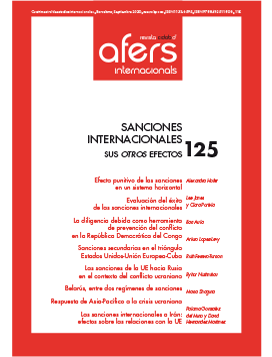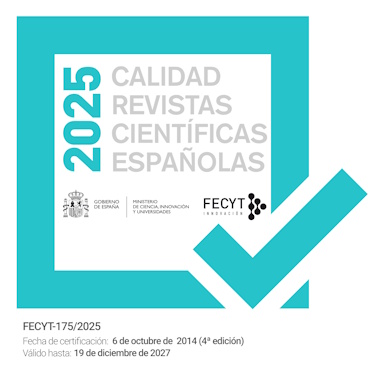Secondary sanctions in the United States-European Union-Cuba triangle
Keywords:
United States, European Union, Cuba, Helms-Burton Act, secondary sanctions, strategic trianglesAbstract
Revista CIDOB d’Afers Internacionals, nº 125
Quadrimestral (May-September 2020)
ISSN:1133-6595 | E-ISSN:2013-035X
DOI: doi.org/10.24241/rcai.2020.125.2.87
This paper examines secondary sanctions as part of the triangular relations between the United States, the European Union and Cuba. The analysis – built on Dittmer’s (1981) strategic triangle theory and Womack’s (2016) studies of asymmetric relationships – questions the evaluation of sanctions carried out by the US Departments of State, Commerce and the Treasury, noting that, by prioritising the impact on the target’s economy, the evaluation ignores other fundamental effects of the sanctions in terms of triangular relations with allies and alternative powers.
>> The full text articles of this issue are available only in Spanish language
References
Adler-Nissen, Rebecca. «Stigma Management in International Relations: Transgressive Identities, Norms and Order in International Society». International Organization, vol. 68, n.° 1 (2014), p. 143-176.
Baldwin, David. «The Sanctions Debate and the Logic of Choice». International Security, vol. 24, n.° 3 (1999), p. 80-107.
Bull, Hedley. The anarchical society: A Study of Order in World Politics. Londres: McMillan, 1977, p. 194-222.
Clark, Harry. «Dealing with U.S. extraterritorial Sanctions and Foreign Countermeasures». University of Pensylvania Journal of International Economic Law, vol. 20, n.° 63 (2004), p. 455-489.
Comisión Europea. «Declaración conjunta de la Alta Representante / Vicepresidenta Federica Mogherini y de la Comisaria Europea de Comercio Cecilia Malmström sobre la decisión de los Estados Unidos de aplicar el Título III de la Ley Helms Burton (Ley Libertad)». Bruselas: Comisión Europea (17 de abril de 2019) (en línea) https://ec.europa.eu/commission/presscorner/detail/es/STATEMENT_19_2171
Dittmer, Lowell. «The Strategic Triangle: An Elementary Game Theorethical Analysis». World Politics, vol. 33, n.° 4 (1981), p. 485-516.
Drezner, Daniel. «Does the U.S. government need to assess economic sanctions better?». Washington Post., (9 de octubre de 2009) (en línea)
EFE-DPA. «EU urges companies to counterattack US lawsuits on Cuba». EFE, (17 de abril de 2019) (en línea) https://www.efe.com/efe/english/ world/eu-urges-companies-to-counterattack-us-lawsuits-on-cuba/50000262-3954708
European Union. «EU takes action agains Helms-Burton, D’Amato Acts». Eurecom, vol. 8, n.° 9 (octubre de 1996) (en línea) http://aei.pitt.edu/83523/1/8.9.pdf
Farrell, Henry y Newman, Abraham. «Weaponized Interdependence». International Security, vol. 44, n.° 1 (2019), p. 42-79.
Gordon, Joy. «Revisiting Smart Sanctions». Ethics & International Affairs, vol. 25, n.° 3 (2011), p. 315-335.
Gordon, Joy. «The Hidden Power of the New Economic Sanctions». Current History, vol. 118, n.° 804 (2019), p. 3-10.
Jacobson, Louis. «Did Donald Trump turn around US record in the WTO?». Politifact, (16 de agosto de 2019) (en línea) https://www.politifact.com/truth-o-meter/statements/2019/aug/16/donald-trump/did-donaldtrump-turn-around-us-record-wto/
Jiménez, Rosa. «Borrell se estrena ante ministros de la UE pidiendo unidad
para ser potencia global». La Vanguardia (19.12.2019) (en línea) https://
www.lavanguardia.com/politica/20191209/472141698928/borrell-seestrena-ante-ministros-ue-pidiendo-unidad-para-ser-potencia-global.html
Kaplowitz, Donna R. Anatomy of a Failed Embargo: U.S. Sanctions Against Cuba. Boulder: Lynne Reiner, 1998.
Kissinger, Henry. Un mundo restaurado. Mexico, DF: Fondo de Cultura Económica, 1973.
Landau-French, Anya. Options for Engagement: A resource guide for reforming U.S. policy towards Cuba. Arlington: Lexington Institute, 2009.
Leogrande, William y Kornbluh, Peter. Back Channel To Cuba. The Hidden History of Negotiations between Washington and Havana. Chappel Hill: University of North Carolina Press, 2014.
Lew, Jacob J. U.S. «Treasury Secretary Jacob J. Lew on the Evolution of Sanctions and Lessons for the Future». Carnegie Endowment for International Peace (30 de marzo de 2016) (en línea) [Fecha de consulta: 17.07.2020] https://carnegieendowment.org/2016/03/30/u.s.-treasurysecretary-jacob-j.-lew-on-evolution-of-sanctions-and-lessons-for-future/
ivpl
Lopez, George. «In Defense of Smart Sanctions». Ethics & International Affairs, vol. 26, n.° 1 (2012), p. 135-146.
Lopez, Juan J. Democracy Delayed. Baltimore: Johns Hopkins University, 2002.
Mearsheimer, John. The Great Delusion. Liberal Dreams and International Realities. New Haven: Yale University Press, 2018.
Meyer, Jeffrey A. «Second Thoughts on secondary sanctions». University of Pensylvania Journal of International Law, vol. 30, n.° 3 (2009), p. 905-967.
O’Sullivan, Meghan. Shrewd Sanctions: Statecraft and State Sponsors of Terrorism. ashington, D.C.: Brookings Institutions, 2003.
OnCuba. «Cuba y la UE abordan en La Habana escalada del embargo de Estados Unidos». OnCubanews, (29 de noviembre de 2019) (en línea)
https://oncubanews.com/cuba/cuba-y-la-ue-abordan-en-la-habana-escalada-del-embargo-de-eeuu/
Pape, Robert. «Why Economic Sanctions don’t work». International Security, vol. 22, n.° 2 (1997), p. 90-136.
Perera, Eduardo. La Política de la Unión Europea hacia Cuba: Construcción, Inmovilismo y Cambio (1992-2017). La Habana: Ruth Casa Editorial-Fundación Friedrich Ebert, 2017.
Psaki, Jen. «Sanctions 101 How Sanctions are implemented. Conversation with Gretta Lichtenbaum». Sanctions 101 Diplopod-Podcast, (17 de octubre de 2018) (en línea) https://the-world-unpacked.simplecast.com/episodes/023430bb-023430bb
Sayre, Anne. «Cuba sanctions eased but enforcement trend well behind the curve». Sanctionsalert.com (14 de diciembre de 2016) (en línea) https://
sanctionsalert.com/cuba-sanctions-eased-but-enforcement-trend-well-behind-the-curve/
Schultz, Donald. «The United States and Cuba: From strategic conflict to constructive engagement». En: Schultz, Donald. Cuba after the Cold War. Westport: Greenwood Press, 1994, p. 145-174.
Slaughter, Anne Marie. The Chessboard and the web. New Haven: Yale University Press, 2017.
Smis, Stefaan y Van Der Borght, Kim. «The EU-U.S. Compromise on the Helms-Burton and D’Amato Acts». American Journal of International Law, vol. 93, n.° 1 (1999), p. 227-236.
Spadoni, Paolo. Failed Sanctions: Why the U.S. embargo on Cuba could never work. Gainesville: University of Florida Press, 2010.
Swanson, Ana. «Trump Cripples the WTO as Trade War Rages». The New York Times, (8 de diciembre de 2019) (en línea) https://www.nytimes.com/2019/12/08/business/trump-trade-war-wto.html
Thomas, Daniel. The Helsinki Effect. Princeton: Princeton University Press, 2001.
Tidey, Alice. «EU warnes of Lawsuits if US targets European interests in Cuba». Euronews, (18 de abril de 2019) (en línea) https://www.euronews.com/2019/04/18/eu-warns-of-lawsuits-if-us-targets-european-interestsin-cuba
U.S. Congress. «Cuban Democracy Act of 1992 (October 23, 1992)». En: Rennack, Dianne y Sullivan, Mark. U.S.-Cuban Relations: An Analytic Compendium of U.S. Policies, Laws & Regulations. Washington. DC: Atlantic Council, 2003a, p. 75-83.
U.S. Congress. «Cuban Liberty and Democratic Solidarity (LIBERTAD) Act of 1996 (March 12, 1996)». En: Rennack, Dianne y Sullivan, Mark. U.S.-Cuban Relations: An Analytic Compendium of U.S. Policies, Laws & Regulations. Washington, D.C.: Atlantic Council of the United States, 2003b, p. 85-131.
U.S. Department of Commerce. «ING Bank N.V. Agrees to Forfeit $619 Million for Illegal Transactions with Cuban and Iranian Entities». Bureau of Industry and Security, U.S. Department of Commerce, (12 de junio de 2012) (en línea) https://www.bis.doc.gov/index.php/all-articles/66-about-bis/newsroom/press-releases/370-ing-bank-n-v-agrees-to-forfeit619-million
U.S. Government Accountability Office. Economic Sanctions. Agencies Assess Impacts on Targets, and Studies Suggest Several Factors Contribute to Sanctions’ Effectiveness. Washington, D.C.: U.S. Government Accountability Office, 2019.
U.S. Treasure Department. «Treasure reaches largest ever Sanctions related settlement with BNP Paribas». Press center (30.06.2014) (en línea) https://www.treasury.gov/press-center/press-releases/Pages/jl2447.aspx
Valdez, Nelson. «Cuba, OFAC, Fines and Extraterritoriality». Counterpunch, (26 de septiembre de 2019) (en línea) https://www.counterpunch.org/2019/09/26/cuba-ofac-fines-and-extraterritoriality/
Vicent, Mauricio. (1998). «Castro advierte que ningún entendimiento entre la UE y Estados Unidos puede realizarse a cuenta de Cuba». El País (25 de mayo de 1998).
Vich, David y Heredia, Ivan. «Ley Helms-Burton: ¿qué implica y de qué mecanismos de defensa disponen los particulares y empresas de la UE?». garrigues.com. (5 de marzo de 2019) (en línea) https://www.garrigues.com/en_GB/new/helms-burton-act-what-does-it-involve-and-what-defenseand-reaction-mechanisms-do-european
Vidal, Pavel. «Las respuestas cubanas a la guerra economica de Estados Unidos». Cuba Capacity Building Proyect, Columbia University, (23 de Diciembre de 2019) (en línea) https://horizontecubano.law.columbia.edu/content/las-respuestas-cubanas-la-guerra-economica-de-los-estados-unidos
Wendt, Alexander. Social Theory of International Relations. Nueva York: Cambridge University Press, 1999.
Womack, Brantly. Asymmetry and International Relationships. Nueva York: Cambridge University Press, 2016.













